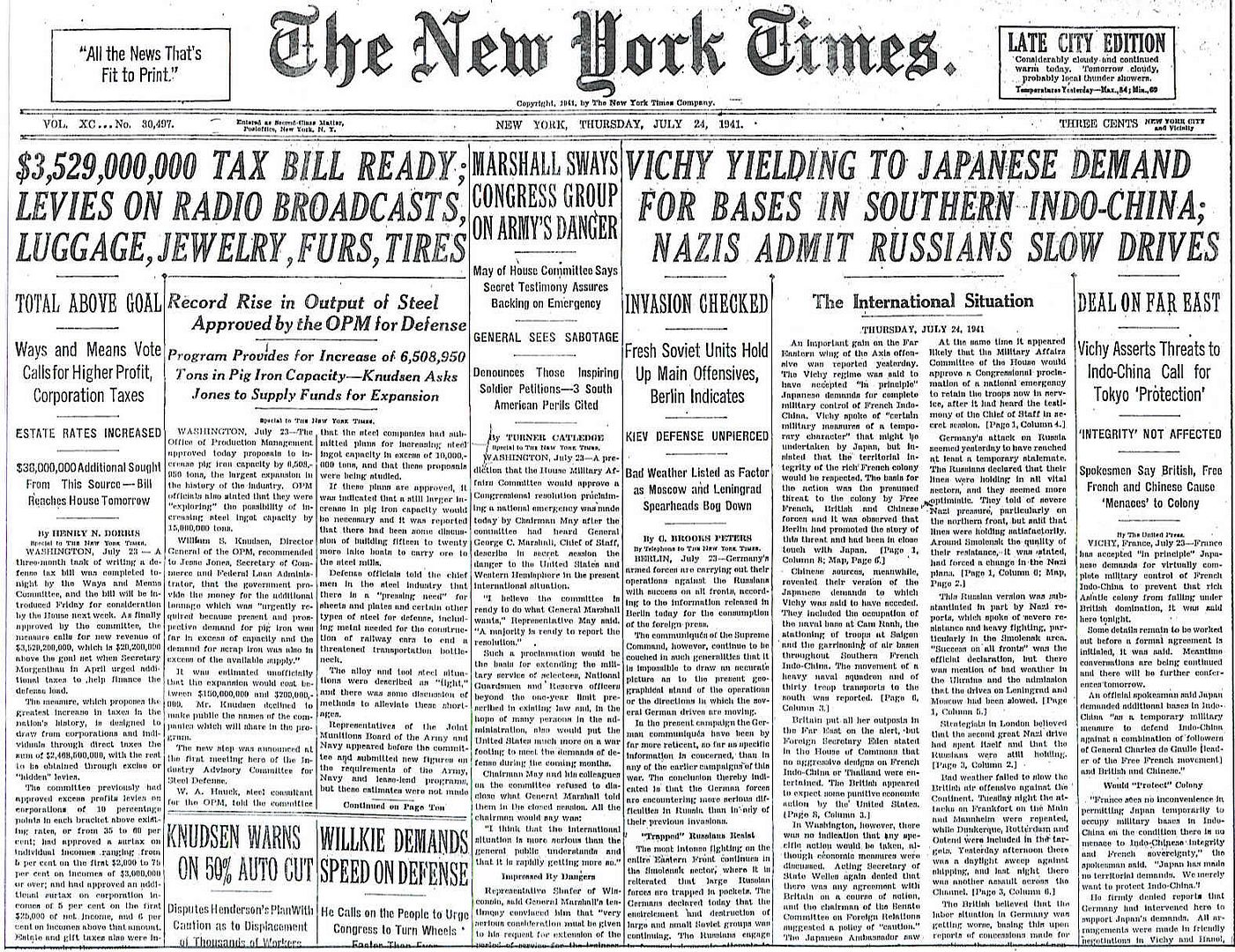
Posted on 07/24/2011 6:06:44 AM PDT by Homer_J_Simpson

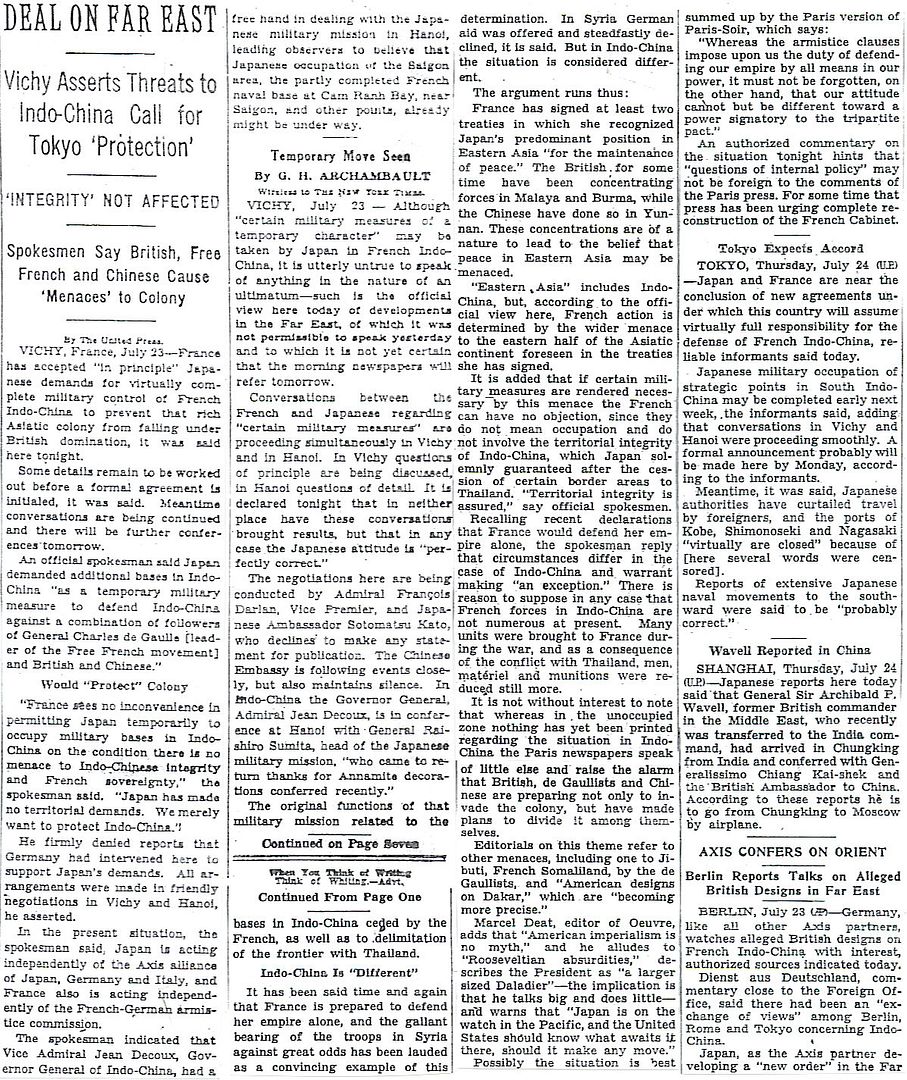
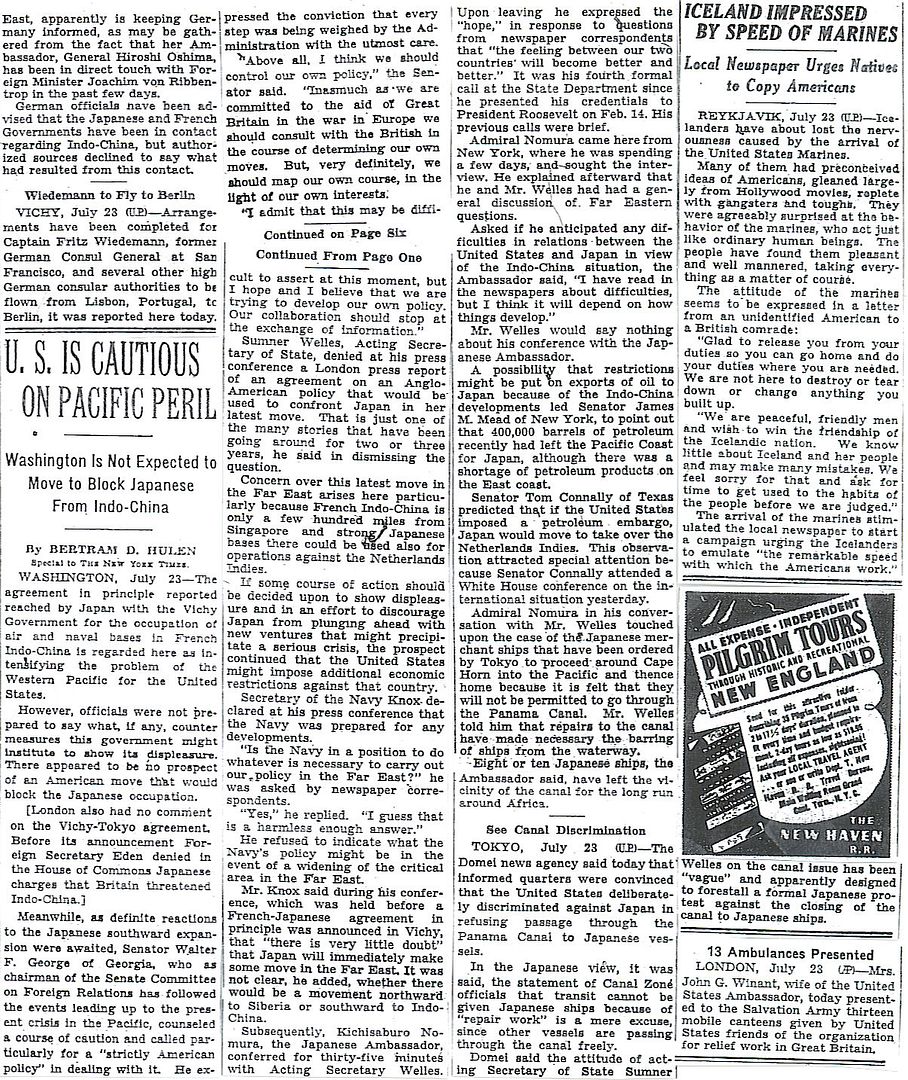
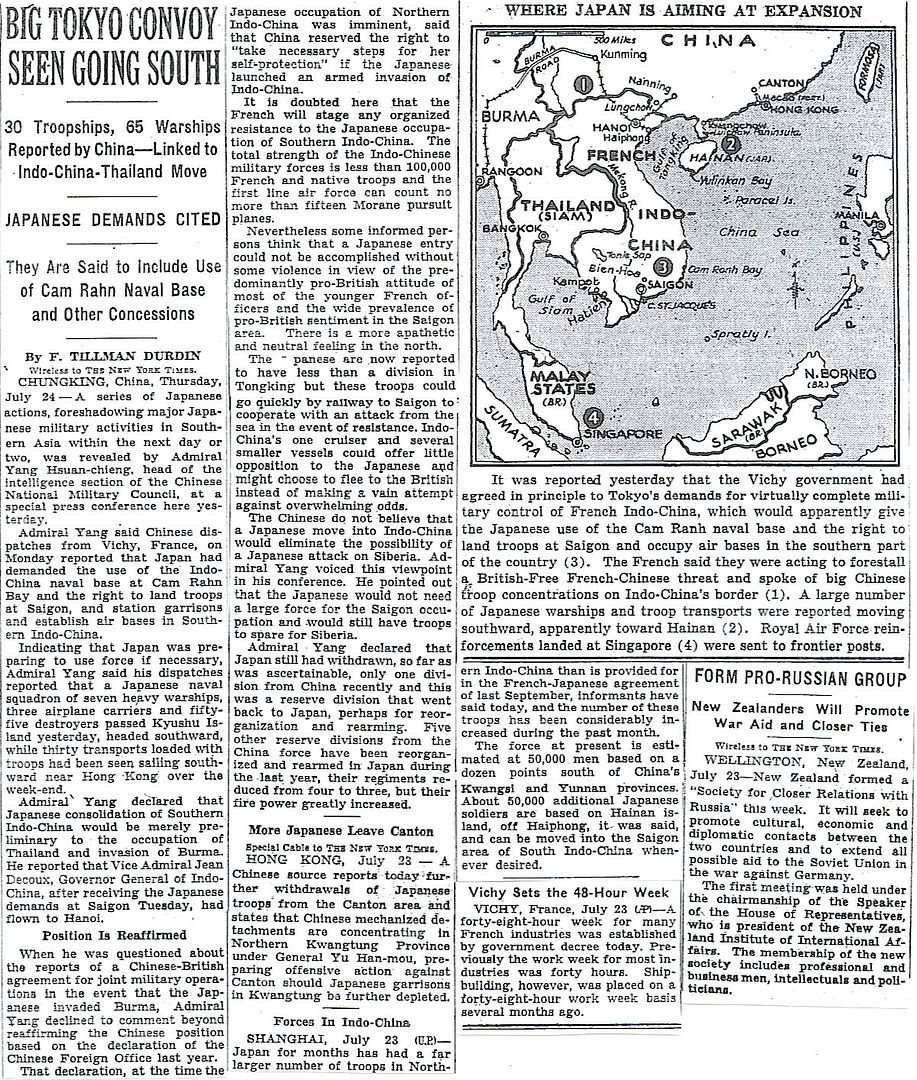
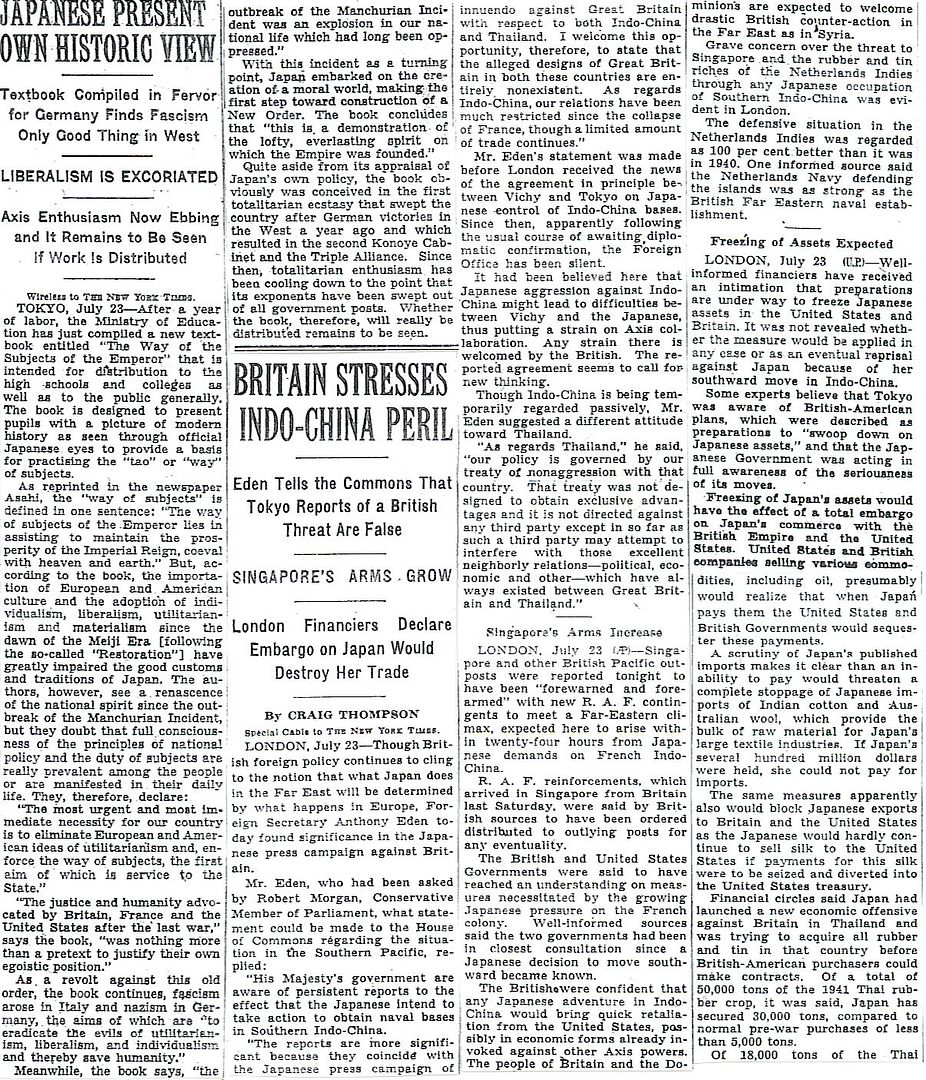
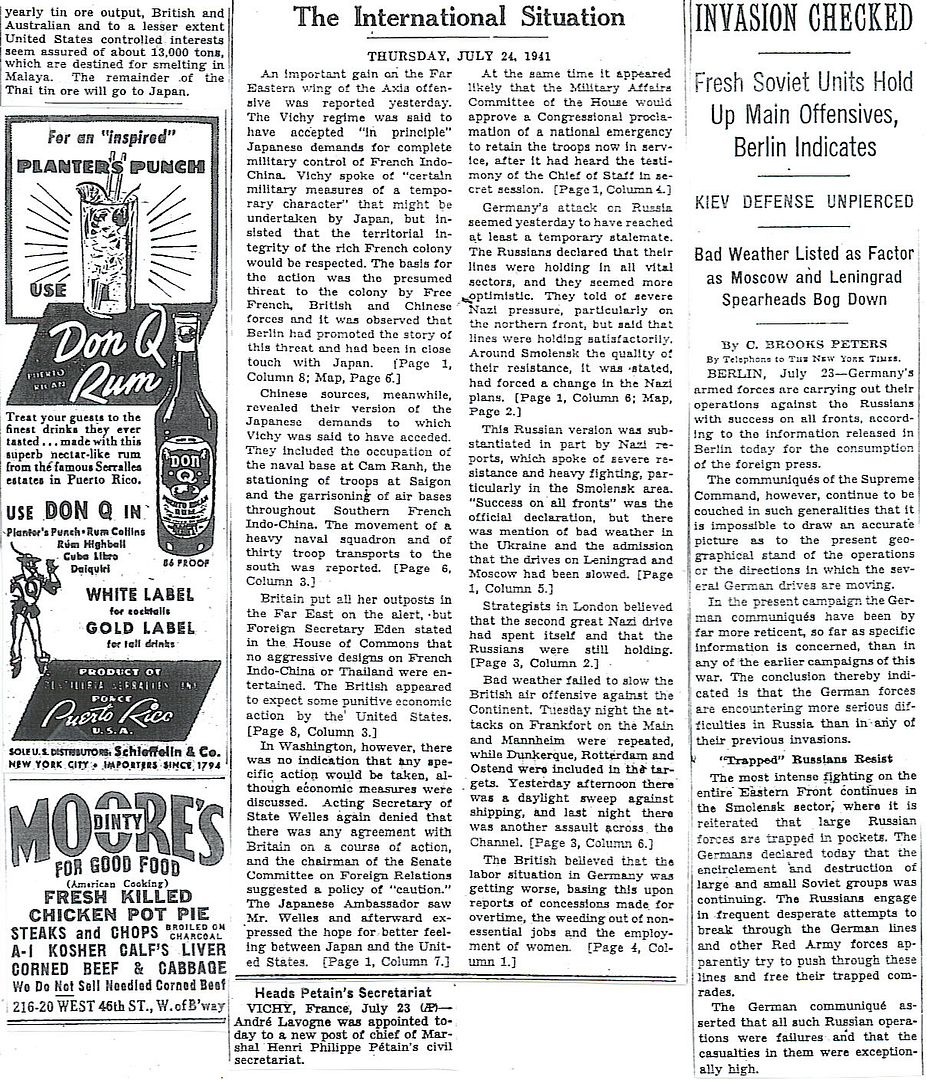
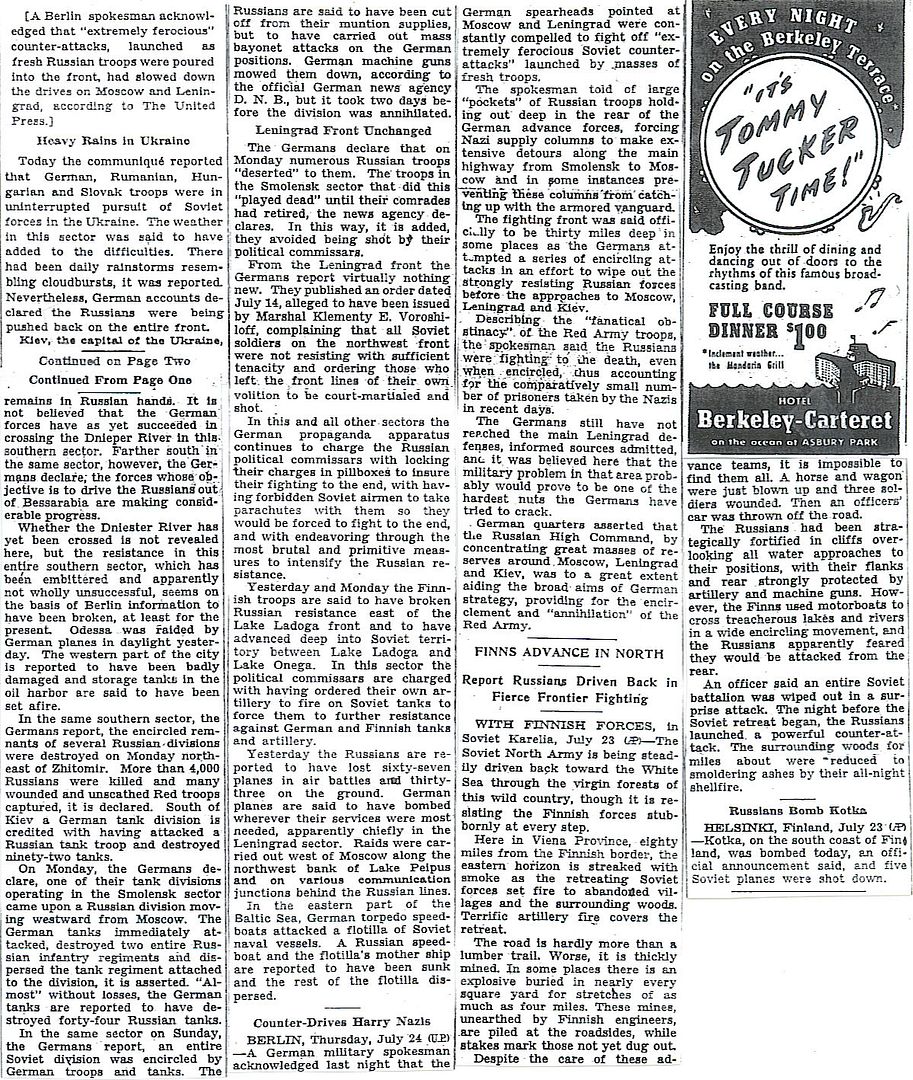
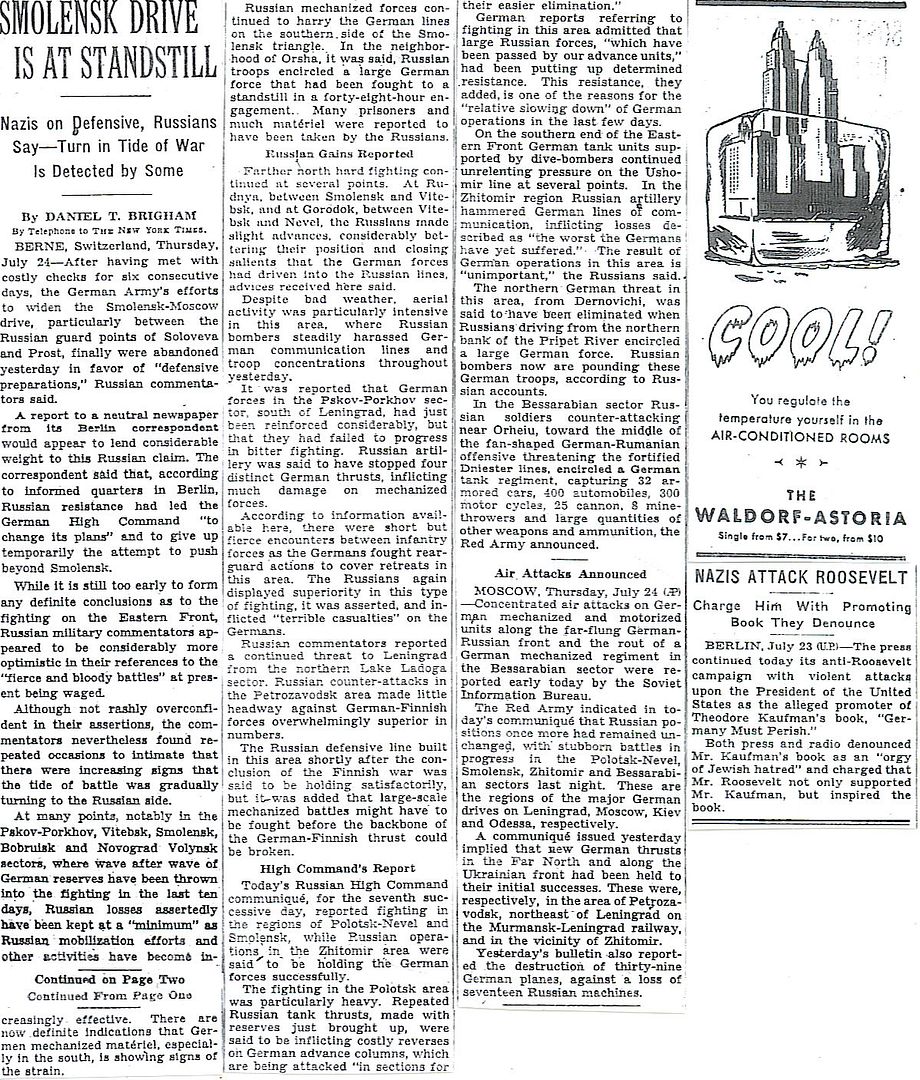
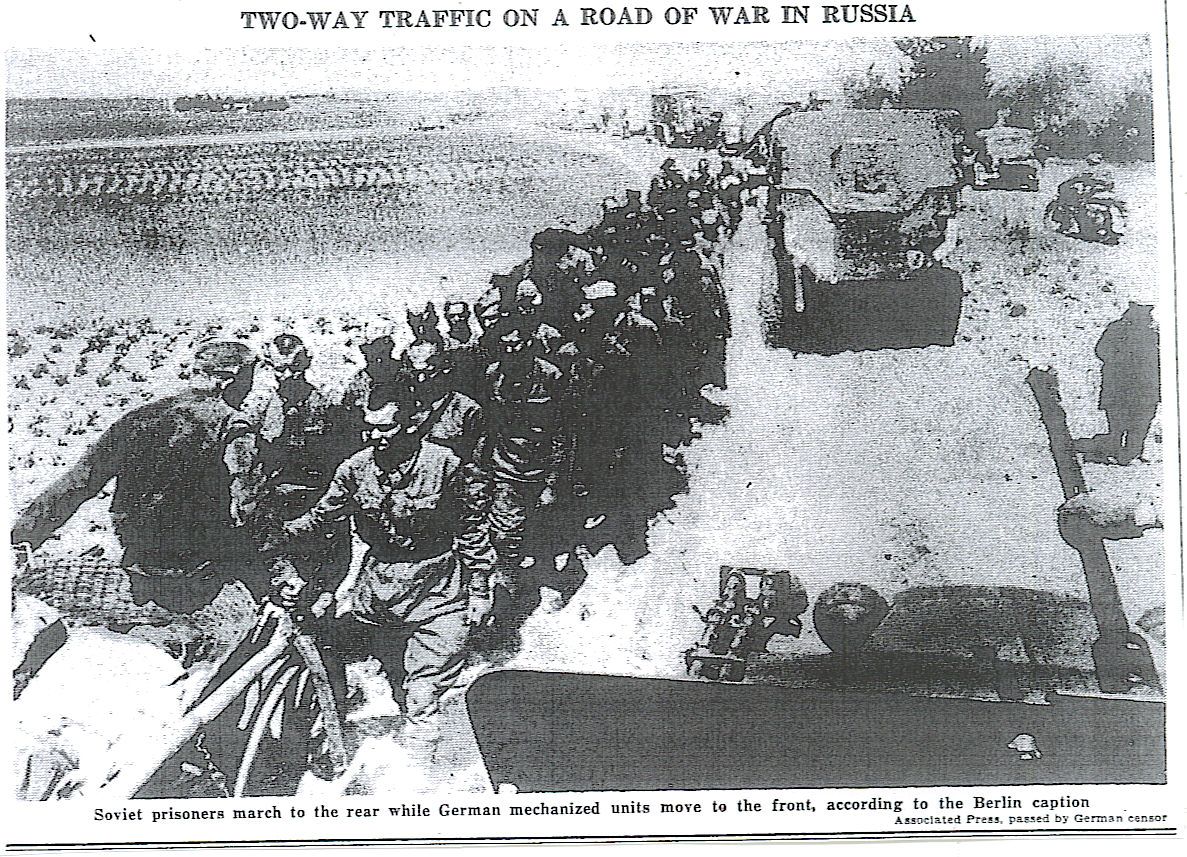
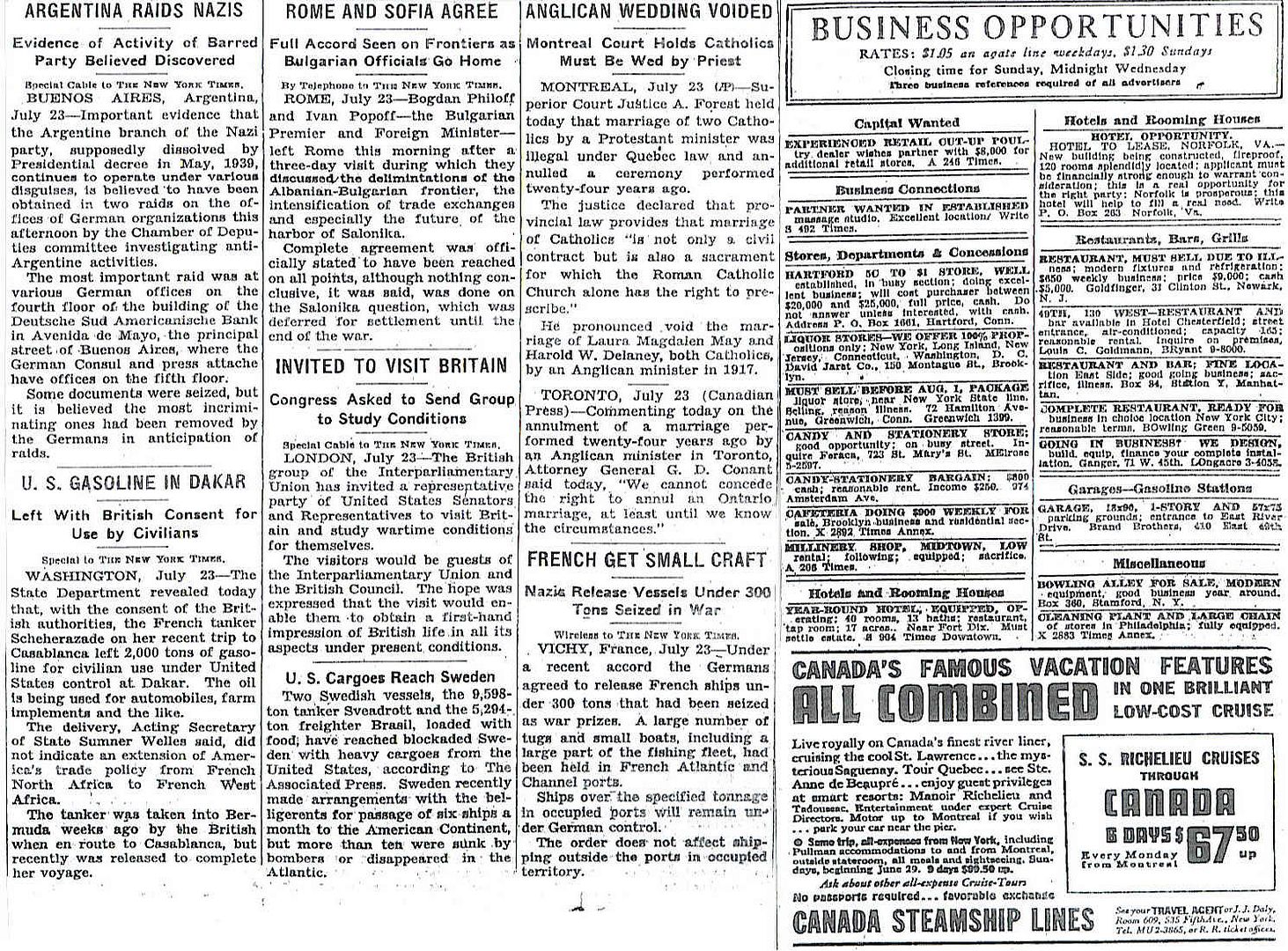
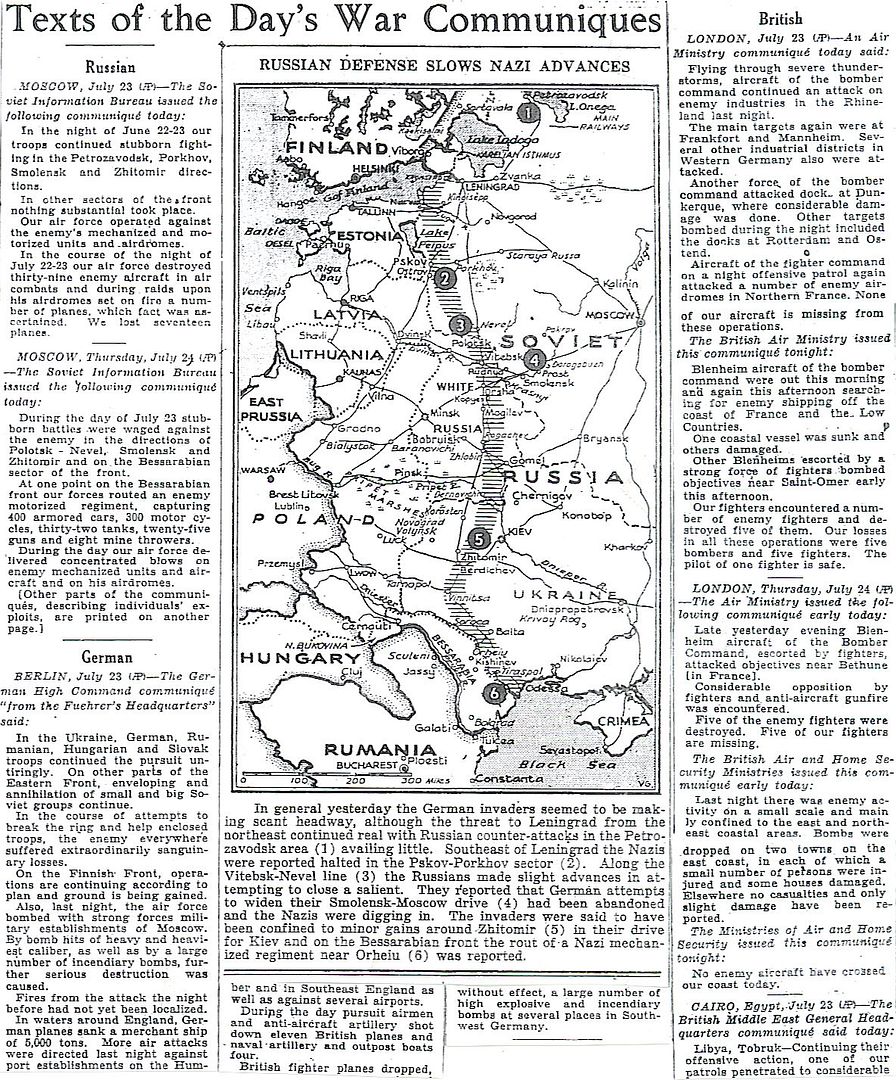
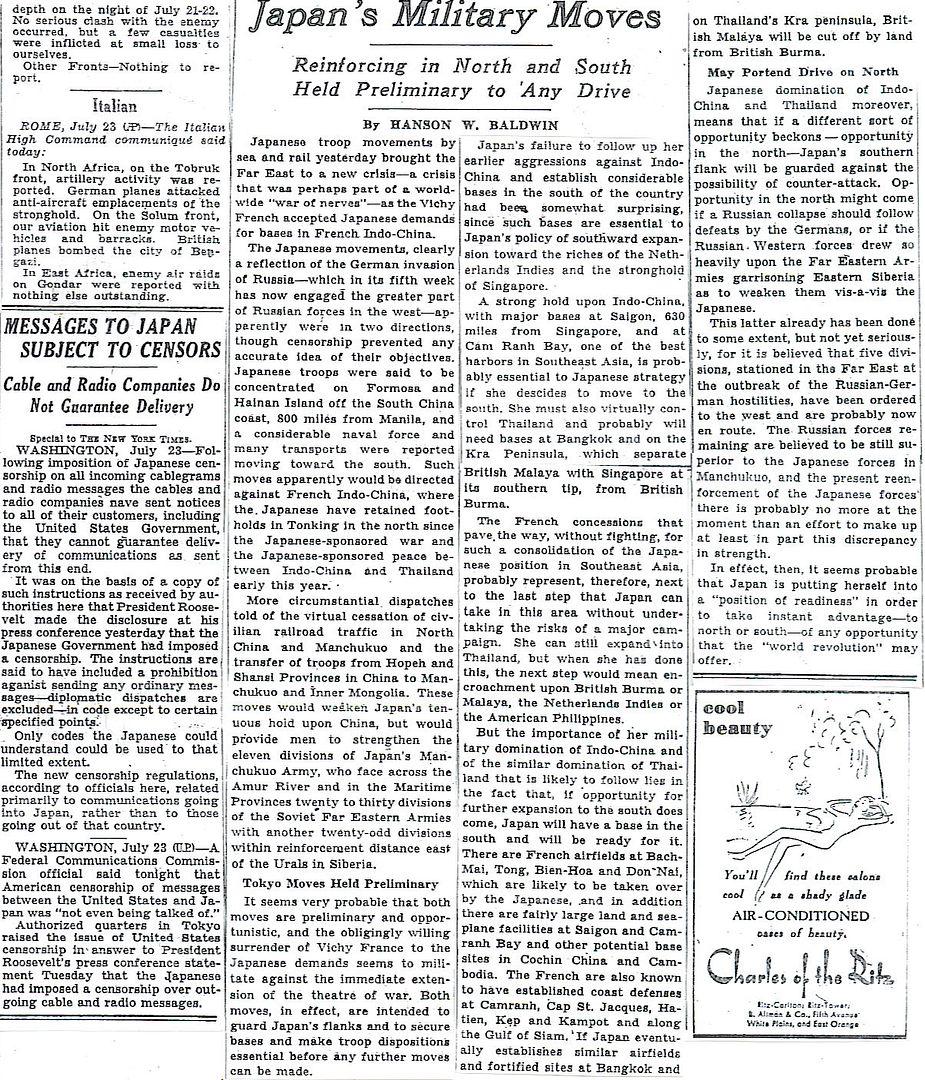
http://www.onwar.com/chrono/1941/jul41/f24jul41.htm
British bombers hit German raiders
Thursday, July 24, 1941 www.onwar.com
Over Occupied France... The Scharnhorst is hit five times by bombs from a force of 15 Halifax bombers while lying in the port of La Pallice. The repairs required will not be complete until 1942. Since Prinz Eugen has been hit earlier in the month and Gneisenau is under repair, this means that none of the German heavy ships in and around Brest are fit for operations in the near future.
In the Mediterranean... One of the British transports engaged in Operation Substance is hit before entering Malta. Empty ships from previous trips join Force H for the return to Gibraltar.
In Tokyo... Vichy France agree to the Japanese demands for bases in southern Indochina.
http://homepage.ntlworld.com/andrew.etherington/month/thismonth/24.htm
July 24, 1941
FRANCE: The Japanese government presented an ultimatum to the Vichy government, on the 19th, demanding bases in southern Indochina. Vichy has conceded today. The Japanese will begin to occupy these bases on the 28th. The ultimatum was decided in the Japanese Imperial Conference on July 2.
La Pallice: RAF Bomber Command sends 15 Halifaxes which score 5 hits and badly damage the Scharnhorst, 3,000 tons of water get on the ship. Heavy cruiser Prinz Eugen is also damaged. (Navy News)
POLAND: An Einsatzgruppe [action squad] commander reports back to Berlin that 4,435 Jews have been liquidated in the town of Lachowicze.
U.S.S.R.: After a long siege, the Soviet defenders of Brest-Litovsk are forced to surrender.
MEDITERRANEAN SEA: (Andrew Galliano) Following Operation Substance a group of empty merchantmen leave Malta for Gibraltar. South of Sardinia they are attacked by SM79s torpedo bombers (280 Sqd), the tanker Hoegh Hood is sunk.
PORTUGAL: The transport USS West Point (AP-23) arrives at Lisbon, Portugal and disembarks German and Italian consular officials who left the U.S. because their offices were closed. (Jack McKillop)
CANADA: Patrol vessel HMCS Andamara assigned to Vancouver, British Columbia. (Dave Shirlaw)
U.S.A.: The government denounces the Japanese actions in Indochina. (Jack McKillop)
FDR publicly questions the political logic of exporting to Japan while a gasoline shortage is expected on the US east coast following the loan of 50 US tankers to take Lend-Lease oil to New York for transfer to British ships. The 50 tankers comprise 20% of the Texas-to-east-coast fleet which deliver 96% of the east coast’s oil. (Edward S. Miller)
30 P-40Cs and three Stearman PT-13 Kaydets of the 33rd Pursuit Squadron (Interceptor) are loaded on the aircraft carrier USS Wasp at Naval Operating Base Norfolk, Virginia. The ship will sail for Iceland on 28 July and the aircraft are launched on the morning of 6 August 1941. (Dave Shirlaw)
fascinating. we forget that france was more of an ally to germany in war than otherwise. i am constantly amazed at the fact that japan was well into the planning of pearl harbor while negotiating with the US. that just blows my mind and makes you wonder about any negotiation in the international sphere.
does anyone know if roosevelt had assessed the possibility of war with japan and what washington thought the liklihood and timing was?
By an amazing coincidence BroJoeK addressed just that on a post this morning on yesterday's thread. I shall attempt to duplicate it here:
Lonesome in Massachussets: "What could possibly go wrong?"
If you assume (and why would you?) that FDR wanted to avoid war at all costs, then obviously, everything went wrong.
But that assumption would be incorrect.
In fact, Roosevelt wanted to do everything he could, short of declared war, to help the allies and prepare Americans for all-out war.
As for declaring war on the Axis powers, Roosevelt knew that could never happen -- and he had promised voters it would never happen -- short of a major attack on the US.
No, some U-boat sinkings of US ships in the Atlantic would not do it.
It had to be a major attack, and the enemy must commit the first overt act of war.
So how was all this going to happen?
Well, there was a plan, called the Eight Action Plan, developed by US naval intelligence (Cmdr. Arthur McCollum).
The plan was intended to provoke the Japanese into war, and one-by-one, FDR executed McCollum's eight actions.
The result, as intended, was war.
Of course, whether FDR & company knew or suspected specifically that Japan intended to attack the fleet at Pearl Harbor is still hotly debated -- i.e., CougarGA7 and I will no doubt go at this one again before December 7.
But the fact that FDR needed and wanted a major enemy attack on US assets -- major enough to declare that "a state of war has existed" -- is beyond dispute, imho.
So, nothing "went wrong."
FDR's plans, brilliantly conceived and flawlessly executed, produced just the results he intended.
Keep in mind this memo is dated 7 October 1940 and my analysis is based on the situation from that time forward to 7 December 1941.
A. Make an arrangement with Britain for the use of British bases in the Pacific, particularly Singapore.
Never happened. The British had been requesting that the U.S. send fleet units at least on visits to Singapore beginning back in the spring of 1940. Both Stark and Marshall were against doing so, and FDR never ordered it.
B. Make an arrangement with Holland for the use of base facilities and acquisition of supplies in the Dutch East Indies.
Never happened. Again, this was deem impractical and not particularly useful for the U.S. Fleet. Makes sense when you consider that current war plans all concede that the Philippines are as good as lost in the event of war against Japan. Why would the DEI be any different?
C. Give all possible aid to the Chinese government of Chiang-Kai-Shek.
Already happening. America has supported the Nationalist since the beginning of the Sino-Japanese war, but aid ramped up in early summer 1940 when T.V. Soong became Chaing Kai-shek's representative in Washington. By August 1940 he had built a good relationship with Morgenthau and they were hammering out the details of a 25 million dollar loan to help the Nationalists with their immediate needs. This, when completed would be hidden as a trade deal by the requirement that the loan be repaid in Tungsten.
D. Send a division of long range heavy cruisers to the Orient, Philippines, or Singapore.
Never happened. In 1940 and 1941 there were only 10 heavy cruisers on the Navy's books. It would have been impracticable to form a heavy cruiser division and transfer it to the Asiatic Fleet. Especially when you consider that the expectation that the Philippines will fall in the event of hostilities putting those larger more expensive ships at risk.
E. Send two divisions of submarines to the Orient. This happened very late in 1941 right after there was a policy shift on the status of the Philippines. When MacArthur was recalled to lead the Philippine forces in late July 1941 it began a paradim shift in the chiefs thoughts as to whether or not the Philippines could be held. By September, Marshall had given priority of materials to the Philippines including B-17 production and a month later SubDiv 15 and SubDiv 16 was sent to the Philippines. This likely had more to do with the shift in strategy than a memo written a year earlier.
F. Keep the main strength of the U.S. fleet now in the Pacific[,] in the vicinity of the Hawaiian Islands
Already happening. I think after Richardson got drummed out after multiple arguments with FDR on where the fleet should be positioned, no one else is going to suggest anything different.
G. Insist that the Dutch refuse to grant Japanese demands for undue economic concessions, particularly oil.
Common sense. Based on H, this would just make sense. If you are going to fully embargo Japan, it only makes sense to ask your allies to do the same. The Dutch did embargo the Japanese, but I'm not sure how much "insist"ing it took. I'd bet not much.
H. Completely embargo all U.S. trade with Japan, in collaboration with a similar embargo imposed by the British Empire
This is why I asked that question yesterday. Without this memo, I would be inclined to do something at least similar to what was done. Maybe not a full embargo, but I probably would have tightened the restrictions already in place at the very least. Was FDR's decision based on the memo? Hard to say. Robert Dallek's book Franklin D. Roosevelt and American foreign policy, 1932-1945 actually claims that FDR didn't order a full embargo in July at all and instead had wanted to just freeze Japanese assets in the United States. When his order was executed, he was in secret conference with Churchill and those who executed the order thought they were following his wishes and froze everything, including licensure. By the time FDR found out about it, it was too late to go back on it or risk showing weakness. Do I believe that? I'm not really convinced honestly since Dallek writings has a known liberal bias. I would have to get a hold of that book again and look at his source material to really make a determination. At any rate, it is entirely possible that even the limited embargo that I think I would be inclined to do and Dallek claim FDR wanted both would have pushed Japan into attacking the U.S. anyway.
Overall, I think the McCollum memo just repeats a lot of things that were already policy, or made suggestions that were not implemented. There are a couple of points that really just match up with what would make sense to do anyway when relations between the U.S. and Japan became more strained. I'm not saying it is entirely insignificant, but it is not the smoking gun that the conspiracy nuts insist it to be.
Disclaimer: Opinions posted on Free Republic are those of the individual posters and do not necessarily represent the opinion of Free Republic or its management. All materials posted herein are protected by copyright law and the exemption for fair use of copyrighted works.